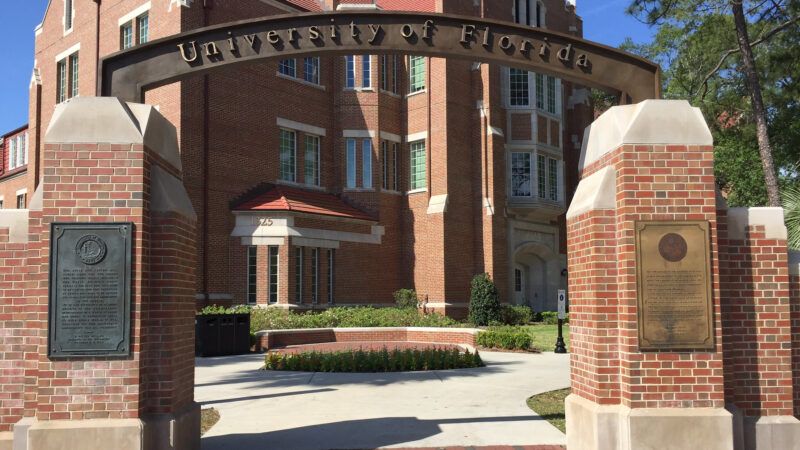University of Florida Suppresses Speech Ron DeSantis Might Not Like, Report Alleges
Keeping professors from testifying in lawsuits isn't the school's only free speech problem

Last month, Reason reported that three professors at the University of Florida (UF) had accused the school of denying them the right to testify in certain lawsuits, possibly because of political pressure from the state government. The university cited its conflict of interest policy, saying that as a public institution, it functions as an arm of the state government. Gov. Ron DeSantis' administration denied involvement in UF's actions.
The professors have filed a lawsuit against the school, and three more instructors from other departments have joined the suit. UF President Kent Fuchs called for an internal "task force" to review the school's conflict of interest policy. That task force later determined that the school's decision-making process "was not subject to external influence."
But last week, the UF Senate Faculty Ad Hoc Committee on Academic Freedom released a report from its own investigation into the allegations, which contradicts the task force's findings.
Contrary to the university's recent statements, the report notes that current policies "do not define a conflict of interest to be taking a stand that might oppose the interests of the executive branch." It further found that among the six professors involved in the lawsuit, "the only consistent factor is that in all these cases faculty were prevented or limited in their ability to participate in lawsuits in which the policies of the current executive administration were challenged in the courts."
The investigation alleges other instances of suppression as well. Among them: "reports that University of Florida employees were told verbally not to criticize the Governor of Florida or UF policies related to Covid-19 in media interactions"; "external pressure to destroy" certain data, as well as "barriers to publication of scientific research" regarding COVID-19; and that "websites were required to be changed, that course syllabi had to be restructured, and that use of the terms 'critical' and 'race' could not appear together in the same sentence or document." If true, that last example would seem to echo the recent trend of Republican-led states drafting laws intended to forbid "critical race theory" instruction.
DeSantis' office has denied any involvement with the university's decisions. Nonetheless, the report corroborates what The Chronicle of Higher Education described as an environment of "university administrators who are hesitant to rile a potentially hostile Republican Legislature, and who are willing to compromise faculty autonomy to avoid essentially poking the bear." If substantially true, the allegations would indicate a campus hostile to free speech, regardless of whether the state government is directly involved.
On college campuses, and especially at public universities, free speech rights are paramount. Just as they apply to students, they apply to professors as well. The Foundation for Individual Rights in Education (FIRE) noted in a letter to UF this month, "It has long been settled that the First Amendment is binding on public universities like UF." And as FIRE's Kelley Bregenzer and Sabrina Conza wrote last week in response to the new report, "Just as preventing professors from testifying as private citizens violates their First Amendment rights, it is also a violation of those rights to prevent faculty from adequately researching and publishing information."


Show Comments (180)